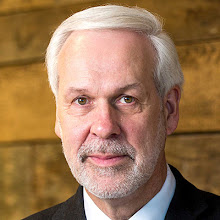He was the president of Southern New Hampshire University. Before joining SNHU, LeBlanc held various positions in academia, including serving as the President of Marlboro College in Vermont and has had a decades long interest in technologies for learning. My idea of the AI University was in part inspired by his success. he doesn't just talk the talk, at SNHU, ha walked the walk, and led the incredible growth on online learning at SNHU to make it the largest University in the US.
His first book Students first; Equity, Access, and Opportunity in Higher Education (2021) takes a holistic look at reimagining Higher Education, covering everything from our ideas of the learner through to financial structures. It is a considered critique of the existing system, which, as the title suggests, is clearly not student-centred.
Critiques are easy, change is difficult and this is where LeBlanc has real credibility. Once we see a system as that prioritises flexibility, accessibility and student success we can design innovative solutions. The current system is inflexible, has deeply embedded old practices and is far too expensive. It is also too remote from the real world. Education should be for life and living.
Given his background, which he explains in detail, he supports what he gained from, a student-first perspective, where institutions are deeply committed to student success, which only comes from understanding each student's unique background, challenges and goals.
Only then does he focus on delivering on this promise through competency-based education, online learning and flexible pathways that acknowledge students needs and real lives. A critical aspect of his model is to lower costs to address systemic inequities in higher education. The curriculum must deal with real-world skills and the needs of the modern labour market, preparing students not just for degrees but for meaningful careers. He is right here. The current system pretends that it is all about the intellectual journey, while making tons of money from future Dentists, Doctors, lawyers, Engineers, teachers and Nurses. In an age of critical skills shortages, we need at least some institutions to tackle this global issue.
He is also clear on the demands on leadership to drive change, the need of a culture of innovation and the need to be political savvy. In this sense the book is a call to action. Put the student first, and he means the many not the selected few, and all follows.
In Broken (2022) he tackles the wider problems of existing approaches to problems in education, health, and other social systems. In all of this he abhors systems that result in failure, debt, emotional trauma and inequalities.
SNHU
LeBlanc admits that his route into online learning was part accident, as SNHU had satellite sites on Navy bases. The Navy has lots of learners at sea, so started delivering distance learning courses in 1995. As SNHU was serving a non-traditional student audience he also puts some of the early success down to this. There was little money and as a small campus, status was not a huge problem. It is both money and status, he thinks, that holds the system back.
LeBlanc transformed SNHU from 2500 students in 2003 to over 200,000 students in 20 years by using technology to switch delivery online. This was an early, significant and relentless investment in pursuit of a more scalable model using online education.
He learnt a lot from The University of Phoenix experiment and had a clear focus on treating applicants well, making the process quicker and easier. A fundamental aim was to keep tuition costs low and provide support for students from diverse backgrounds. LeBlanc has been a vocal advocate for making higher education more accessible and affordable. He continues to focus on innovating and adapting to the changing educational needs of students globally, a proponent of competency-based education and other models that prioritize learning outcomes over traditional measures.
SNHU is now one of the largest non-profit providers of online higher education in the country, offering more than 200 accredited undergraduate, graduate, and certificate programs.
AI
Having retired from SNHU, LeBlanc's is now expanding on his work to transform lives by taking on the challenges and opportunities that AI offers. This technology, he thinks, could help us rethink and reimagine education. Freeing ourselves from the current constraints of the existing models we could shift towards a more efficient, human and student-centred model, through AI.
He is working with George Siemens on a learning platform, alongside a solution to the data problem. The problem, they think, is the lack of any sophisticated approach to data, so they are hoping to build a build a global data consortium, with a focus on safeguards on student privacy and solutions to algorithmic bias.
His new focus on AI centres around building a platform. This is worthy but not easy, and the world is littered with failures, as ideas are easy, implementation hard. I’m an admirer but disagree with his view of data as providing insights into learning. This is a long shot, as we have plenty of insights to inform practice through existing research and the data sets, as some have seen, have failed to provide much in the way of meaningful predictive insights. Their focus on bias is also, I think, peripheral if they want to do things that are bigger in education in relation to AI.
Having built one of the largest online HE institutions in the world he has helped advance the cause of online education and Degrees. Many institutions now consider this a key strategic goal, having seen it work at SNHU, Western Governors and elsewhere. He continues to inform and influence the sector through his work on using AI to accelerate progress in the sector.
Bibliography
LeBlanc, P., 2022. Broken: How our social systems are failing us and how we can fix them. BenBella Books.
LeBlanc, P., 2021. Students First: Equity, Access, and Opportunity in Higher Education. Harvard Education Press.

No comments:
Post a Comment